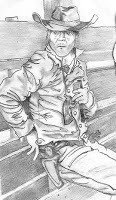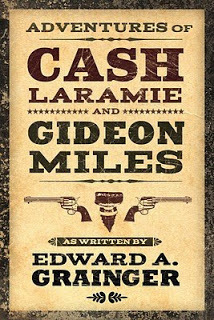David Cranmer's Blog, page 131
June 10, 2011
"For 99 cents, you get a lot of action and adventure."
Mel Odom on this incredible new collection I'm curious to know if you have heard about. Check out Mr. Odom's recommendation here.
Published on June 10, 2011 08:27
Under the Sun
Published on June 10, 2011 07:44
Edward A. Grainger, Adventures of Cash Laramie and Gideon Miles
Ron Scheer with a review of my western noir eBook.
Published on June 10, 2011 03:42
June 9, 2011
Summer Reading: Comics
Published on June 09, 2011 10:45
Meet Cash Laramie
ADVENTURES OF CASH LARAMIE AND GIDEON MILES should be available on Kindle tomorrow for 99 cents. Here is a mini-profile of The Outlaw Marshal.
 Age: 30 (born November 24, 1855)
Age: 30 (born November 24, 1855)
Height: 6'
Eyes: Blue
Hair: Dark
Characteristics: He wears an Arapaho arrowhead made by his stepmother around his neck. His catch phrase is "Wouldn't you like to think so." He smokes cheroots and drinks Maryland Rye.
Occupation: Deputy U.S. Marshal working out of the federal building in Cheyenne Wyoming Territory.
Nickname: Referred to as The Outlaw Marshal for his tendency to be brutal and walk the fine line between good and evil when it comes to delivering his unique brand of justice.
Friends: His only close relationships is with his prostitute girlfriend named Lenora Wilkes and his partner, Gideon Miles.
Illustration of Cash Laramie by William Ervin.
 Age: 30 (born November 24, 1855)
Age: 30 (born November 24, 1855)Height: 6'
Eyes: Blue
Hair: Dark
Characteristics: He wears an Arapaho arrowhead made by his stepmother around his neck. His catch phrase is "Wouldn't you like to think so." He smokes cheroots and drinks Maryland Rye.
Occupation: Deputy U.S. Marshal working out of the federal building in Cheyenne Wyoming Territory.
Nickname: Referred to as The Outlaw Marshal for his tendency to be brutal and walk the fine line between good and evil when it comes to delivering his unique brand of justice.
Friends: His only close relationships is with his prostitute girlfriend named Lenora Wilkes and his partner, Gideon Miles.
Illustration of Cash Laramie by William Ervin.
Published on June 09, 2011 09:49
Kids and Reading
How to Kill the Love of Reading at January Magazine and my buddy Charles Gramlich with To Make A Reader.
Published on June 09, 2011 07:58
An Article I Missed
Published on June 09, 2011 06:44
June 8, 2011
Foreword by Chris F. Holm for Adventures

I have a confession to make: I've never been a fan of Westerns. Don't get me wrong, I've got nothing against them—it's just they never grabbed me in the way a good detective story grabs me. They always seemed to me as dusty as the desert towns in which they're set, more museum pieces than living, breathing stories. Relics of a bygone era.
My Papa would've shaken his head to hear me say that. He was a cop, and a consummate storyteller; it was from him I inherited my penchant for writing and reading crime fiction. But Papa didn't discriminate between a good cop story and a good Western. To him, it didn't matter if Eastwood was wearing a poncho and a wide-brimmed hat or a suit and a badge—there the clicker stopped either way. I always figured it was generational—for Papa, crime and Westerns were of a piece, but as a little kid whose feet couldn't reach the floor as I sat on the couch beside him, the Wild West seemed as far away as Roman times, and as textbook-dull as well.
So it was with trepidation I read the first Cash and Miles story David Cranmer sent my way. "Miles to Go," this was. It's not that I doubted David's talents as a writer—I simply felt that Westerns were (caps warranted) Not My Thing. I figured I'd give the story a skim, find a sentence or two I thought worth highlighting, and pass along a "Job well done."
Instead, I found myself riveted. Cash and Miles proved to be nuanced, interesting characters, men whose honor and decency divorced them from the petty prejudices of their time, but whose backgrounds placed them in the centers of said prejudices nonetheless. What's more, the deft hand with which David dealt with matters of class and race made the story...well, not modern, exactly, so much as timeless and universal, and certainly a far cry from the museum pieces of my youth. And to cap it all off, the story itself was breakneck: a thrilling manhunt, a tale of battle-hardened friendship, all draped effortlessly in Western trappings. For me, the story struck the perfect balance between crime and Western fiction, and in so doing, provided me an entry point to a vibrant genre that had heretofore proved inaccessible to me.
Since that day, I've eagerly consumed every scrap of Cash and Miles I could get my eyeballs on (occasionally, I confess, nudging David to write another when I'd exhausted the existing supply). And I've started delving into the Westerns of David's fellow fence-straddlers—guys like James Reasoner and Elmore Leonard, who, like my Papa, didn't see much of a division between cowboys and crime at all.
I don't mind telling you that, in this instance, being proved wrong doesn't suck a bit.
'Course, if my Papa were still around, he'd be sure to say I told you so.
Published on June 08, 2011 11:12
The demise of a 1950s starlet
Mr. Thomson has a fine article in The New Republic.
Published on June 08, 2011 08:42



